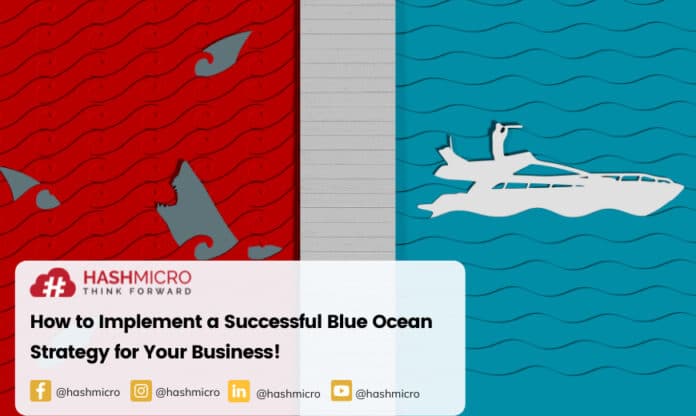Entrepreneurs must create innovative and creative marketing automation concepts and tactics to compete in today’s more competitive business environment. Companies must be superior to beat their competition to survive and continue to expand. As a result, you must implement business breakthroughs that your competitors would find unfathomable. The blue ocean strategy is one of the techniques employed by entrepreneurs.
Table of Contents
- Understanding Blue Ocean Strategy
- The difference between Blue Ocean Strategy and Red Ocean Strategy
- Benefits of Implementing Blue Ocean Strategy
- Advantages of Blue Ocean Strategy
- Disadvantages of Blue Ocean Strategy
- 5 Steps to Implement the Successful Blue Ocean Strategy
- Tips on applying the Blue Ocean Strategy
- Examples of Companies that Implementing Blue Ocean Strategy
- Conclusion
Understanding Blue Ocean Strategy
Blue ocean strategy pursues differentiation while maintaining a low-cost structure to create new market space and demand. It is about establishing and capturing uncontested market space and rendering competitors irrelevant. Moreover, it is predicated on the premise that market borders and industry structure are not fixed in stone and may reconfigure by the actions and beliefs of industry participants.
To put it another way, the blue ocean strategy is a concept from strategic management that relates to methods for entering new markets by establishing unique and inventive demands. It is more successful in attracting customers by developing fresh, never-before-seen products than to compete with customers in the same market.
Read more: Here are The 17 Best ERP Software in Singapore You Should Know in 2021
The difference strategy between blue ocean vs red ocean
There are several differences between the blue ocean vs red ocean. When it comes to red oceans, industry boundaries have been set, and the rules of the competitive game are well understood. Companies compete to outperform their competitors to capture a more significant portion of the current market demand. As the market becomes more crowded, earnings and growth become less effective. Products are reduced to commodities, resulting in the fierce or ‘bloody’ rivalry between companies. As a result, the phrase “red oceans” was created.
On the other hand, blue oceans represent all of the sectors that do not exist today or the untapped market area that is free of competition. Demand is produced rather than fought over in blue waters. There is plenty of room for both lucrative and quick expansion. A match is meaningless in blue waters since the rules of the game have yet to be established. The term “blue ocean” is company use to express the vast, untapped potential of the untapped market area. In terms of lucrative growth, a blue ocean is broad, deep, and strong.
Benefits of Implementing Blue Ocean Strategy
After talking about the differences between the blue ocean vs red ocean, there is also the advantage of implementing a blue ocean strategy is that rivals may become market leaders without competing in the same region as the company. Therefore, incorporating this method into their business may help customers become more interested in the innovation that is presented and the advantages and value of their goods. Ultimately, this will allow business actors to meet the demands and curiosities of customers looking for fresh innovations that are more intriguing and beneficial.
Advantages of Blue Ocean Strategy
The following are some of the advantages of a blue ocean strategy:
- The determination of selling prices in the red ocean is doesn’t affect the rivals’ efforts to increase the quality of the company’s output and keep it afloat in the case of an economic downturn.
- Because the corporation must issue items that are not yet on the market, this technique might improve the possibility for high profitability. This is because potential clients will recall the first product pioneer in a specific product category far more quickly.
Disadvantages of Blue Ocean Strategy
While some of the blue ocean strategy’s disadvantages that you should be aware of include:
- To start a company, you will need a lot of money and time.
- There is a need for personnel who assist corporate operations to educated.
- Because the product is still new, there are no devoted clients who are constantly eager to purchase. So, to get it, you must correctly educate prospective clients so that they do not form incorrect opinions.
5 Steps to Implement the Successful Blue Ocean Strategy
Learn how to effectively start a Blue Ocean program in even the most complex company locked in a Red Ocean by following the steps outlined below. The five steps are as follows:
- Firstly, selecting an appropriate starting point and putting together the most appropriate Blue Ocean team for the endeavor
- Obtaining a comprehensive understanding of the existing situation
- Discovery of previously unidentified pain points that are limiting the existing scale of the sector and the discovery of a vast ocean of non-customers
- Market boundaries are systematical, reconstruct, and alternative Blue Ocean prospects are developing.
- Selecting the most appropriate strategy, executing fast market testing, completing and implementing the change are essential steps.
The company may go from the constraints of competing inside the current industry (“settlers”) to better value improvement (“migrators”), and finally to providing new value for individuals who aren’t already customers (the “pioneers” of marketing-creating innovation) through this process.
Tips on applying the Blue Ocean Strategy
Without innovation, your business will be challenging to run and develop. As a business person, it is essential to create a strategy first. Here are the tips for applying a blue ocean strategy for your business:
1. Examine various industries
Firstly, you should thoroughly examine famous sectors and their goods to uncover a new trend or demand in the market. Check to see whether clients are entirely pleased with the services that are currently in place.
2. Determine the nature of the problem
Secondly, as soon as you see anything that isn’t quite as fantastic as it may be, consider what you can do to rectify the situation for consumers and make them more satisfied with your offering overall. Instead of concentrating on what your rivals have done wrong, focus on how you can make the lives of your consumers simpler.
3. Implement
Lastly, after you provide do all those steps below, it is now time to implement the plan.
Examples of Companies that Implementing Blue Ocean Strategy
1. Netflix
Netflix, a hugely successful subscription-based streaming service, is one of the firms using this blue ocean approach. As more individuals use the Internet, Netflix has evolved into a streaming service for various films and television episodes. Moreover, Netflix has already successful in transforming a dwindling red ocean into an opportunity for the blue sea. Netflix’s strategy includes closing physical locations and making all films accessible online. Since then, Netflix has paid for movie licensing solely, avoiding the cost of purchasing and storing DVDs. This is a significant development for this sector.
2. iTunes
When iTunes first appeared on the market, it addressed the recording industry’s dilemma of users illegally downloading music while also meeting the demand for digital, a la carte tunes. The strategy at iTunes introduced a whole new category of music sales, allowing artists to benefit and customers to purchase single songs rather than complete albums. Over the years, iTunes has dominated the industry and is renown for driving the expansion of digital music.
Some of the examples shown above are effective blue ocean techniques in the real world. This approach starts with examining possible market possibilities to boost the company’s earnings.
Conclusion
Essentially, the blue ocean strategy is a component of a marketing plan for growing your business. It is believed that this plan would generate interest in your goods among consumers due to a novel and original marketing technique. You must consider data, such as the company’s financial ERP software data while undertaking this strategy.
To simplify financial data management, utilize the most acceptable bookkeeping practices and accounting systems that can extract financial information in real-time to assist you in making better company choices. One of the best alternatives is to use HashMicro’s Cloud-Based Accounting Software.
Related articles:





































